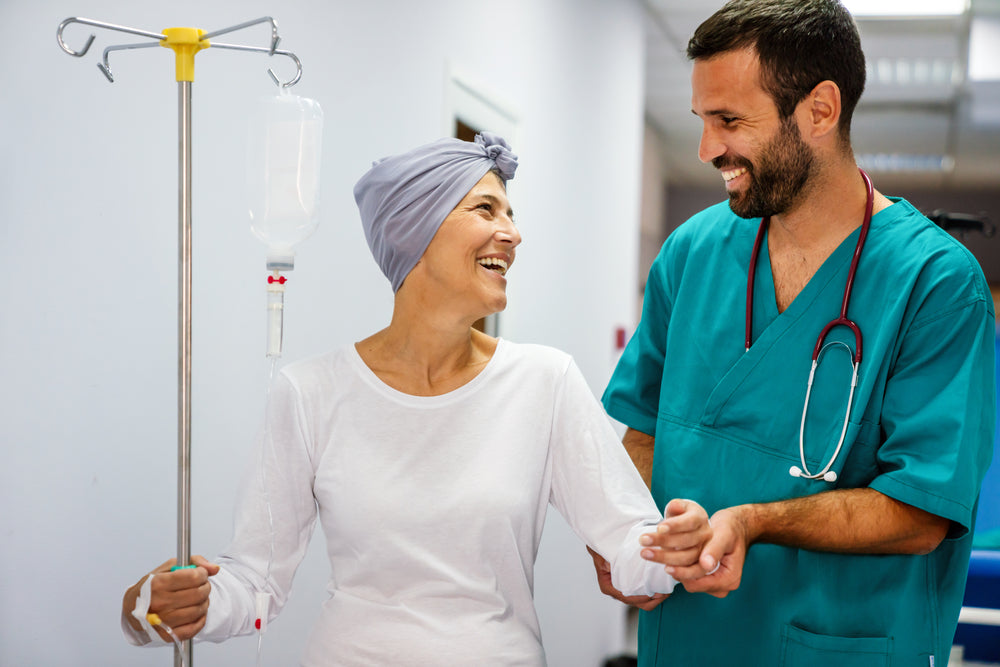Chemotherapy: what it is and how to cope with it

It's very common that when searching for information about chemotherapy treatment, the results are not encouraging. However, we rarely talk about its benefits and why for many cancer patients it is the best option and the alternative with the greatest hope of recovery.
In this article, you will learn more about the importance of chemotherapy, how to reverse its side effects, and even best practices to increase its effectiveness.
What is Chemotherapy?
Let's begin by explaining that chemotherapy is a cancer treatment that uses drugs to fight cancer cells by interfering with their ability to grow and divide. This therapeutic approach is systemic, as it is distributed through the bloodstream and reaches all regions of the body.
Chemotherapy has two main purposes and is used according to the needs of each patient or type of cancer:
Medication for Cancer
Chemotherapy is used with the aim of curing cancer, reducing the risk of its recurrence, or slowing its growth.
Mitigation of Cancer Symptoms
Chemotherapy can be used to shrink tumors that cause discomfort and other inconveniences.
How Does Chemotherapy Work?
To understand how chemo works, it is important to know the phases of the cells, which you can see in this image:

In a normal cell cycle, cells divide and die in a regulated manner. Cancer cells divide uncontrollably, forming a tumor. Chemotherapy acts on dividing cells, as most cancer cells are in this state, which produces side effects as it also affects healthy cells. Balancing the destruction of cancer cells and the protection of healthy ones is essential during chemotherapy.
What are the Types of Chemotherapy?

We know that chemotherapy treatments are challenging for the body and mind. Some first-time patients wish for a manual to make this medication easier to endure, so here are some facts you should know and that few people will tell you if you are unfortunately facing chemotherapy for the first time.
Chemotherapy Comes with Side Effects
Not everything is perfect, as chemo not only kills cancer cells but also eliminates good cells that the body produces, causing an imbalance known as "side effects," which typically present as fatigue, vomiting, mouth sores, diarrhea, or constipation. This is completely normal.
How to Cope with Chemotherapy?
While chemotherapy helps us, it also affects our bodies with symptoms that can be very unpleasant, so here are some tips to reduce them.
Reduce Fatigue
Take short 15-minute naps, stay active, and drink enough water.
Relieve Nausea or Vomiting
Use prescribed anti-nausea medications, avoid caffeine and fatty foods, eat small portions, and drink room temperature liquids.
Treat Mucositis (Mouth Sores)
Maintain good oral hygiene and avoid hard and spicy foods.
Prevent Constipation
Eat fiber-rich foods, drink water, and do light exercise.
Control Diarrhea
Drink water or oral rehydration solutions and avoid spicy, greasy, and caffeinated foods.
Consume Nutritional Supplements
As previously mentioned, chemotherapy can have a significant impact on the immune system, increasing the risk of infections, dry skin, itching, and hair loss.
One way to reduce these consequences is to maintain a balanced diet that provides the body with the necessary nutrients to face chemotherapy. It is important to note that, in addition to food, it is recommended to complement it with nutritional supplements, as this can considerably reduce side effects.
Enikia: Its main function is to regulate glucose levels in the body, allowing for more effective energy distribution, thus strengthening healthy cells against the wear caused by treatment. Additionally, it plays a crucial role in preventing nutrient oxidation due to free radicals, protecting the integrity of these essential elements.
Enikia addresses the adverse effects of chemotherapy specifically, adapting to different types of treatments, making it a versatile tool for the patient.
Caldone: Turmeric helps prevent harmful inflammatory processes that can be triggered by the immune system in response to cell damage. This inflammation could damage not only diseased cells but also healthy ones affected by chemotherapy. Caldone, with its highly absorbable liquid turmeric, leverages the anti-inflammatory, antimicrobial, and antioxidant properties of turmeric.
This approach helps minimize side effects, protect damaged cells, and maintain a more balanced immune system during treatment.
LedaMix: Assists patients undergoing chemotherapy, consisting of bovine colostrum, an ingredient that strengthens the immune system and contributes to a stronger recovery, minimizing susceptibility to harmful external factors.
Ananke: With its magnesium and essential elements content, it helps stabilize biochemical reactions. By maintaining the stability of internal chemical reactions of cells, Ananke promotes an environment conducive to recovery, especially in muscle cells.
Egeón: Focuses on strengthening bone cells, providing stability to the skeletal system during chemotherapy treatment.
Guanide: Helps improve energy distribution in the body, which in turn, favors cellular recovery after chemotherapy.
Chemotherapy is More Effective at Night
A recent study published in the journal 'Frontiers in Oncology,' led by William Walker, a researcher at the West Virginia University School of Medicine (USA), examines whether the blood-brain barrier is more permeable to chemotherapy drugs at specific times of the day.
His study indicates that this barrier is not static, but dynamic, suggesting that properly timing chemotherapy treatments could improve their effectiveness by better reaching the targeted tumors.
Commonly, patients receiving chemotherapy get their treatments during the day, but “if it turns out that people are more like flies, and the blood-brain barrier opens at night, then that could be the best time to administer chemotherapy," Nelson points out, though this is an avenue that needs further investigation.
And remember that this process is not easy, but it is a path you can go through with different support networks such as family, support groups, or therapy.
If you have any questions, don't forget to write to us on our Facebook or Instagram to get more information about the supplements.
References:
Benefits of good nutrition during cancer treatment. (2022). Cancer.org. https://www.cancer.org/es/cancer/supervivencia/bienestar-durante-el-tratamiento/nutricion/beneficios.html
Mary Calvagna. (2009). Chemotherapy for Cancer Treatment. https://www.empowher.com/media/reference/quimioterapia-para-el-tratamiento-de-c-ncer
National Cancer Institute. (2015). Chemotherapy to Treat Cancer. https://www.cancer.gov/espanol/cancer/tratamiento/tipos/quimioterapia#1

